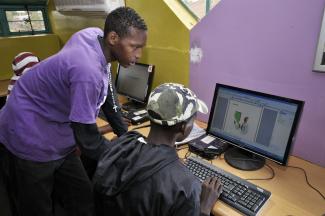Our view
Getting a grip on dangerous trends

From the mid-90s to the Arab spring of 2011, a sense of euphoria was common. Before the 1990s, however, information technology simply did not seem to be relevant for developing countries. That began to change, when international media became aware of the IT hub that had evolved around Bangalore. Next, internet access spread fast, and, though digital divides persisted, the World Wide Web came ever closer to living up to its name. Then mobile telephony conquered much of Africa. Suddenly, Kenya was pioneering mobile money. Digital technology was making a difference in evermore people’s lives, and masses of them were poor.
Mobile phones became commonly used devices even in remote villages. People got access to more information than ever before and started to interact with others who are far away. In many ways, digitalisation was empowering. For example, social media proved essential in the Arab spring. As dictators fell, journalists spoke of “Facebook revolutions”. That was then. Platforms that seemed to facilitate free communication 10 years ago, are now infested with disinformation and propaganda. The business models of established media houses are being undermined, to the detriment of quality journalism. Instead of living in “knowledge societies” as we were promised, we seem to understand less and less.
As a general trend, both public administrations and private-sector businesses are computerised. Digital disruption is common, and leaders in both spheres are paying increasingly close attention to what is discussed online, with some doing their best to manipulate public discourse. Authoritarian populism is gaining ground, while the respect for democracy seems to be waning in many places. China’s communist regime is leading the trend of monitoring citizens, but other governments seem eager to follow.
At the same time, the corporate powers that dominate the internet today are still largely beyond government control. They are not paying taxes commensurate with their revenues. The top managers cultivate a liberal image, but their lobbyists are really only striving to protect the likes of Google, Facebook, Amazon, Microsoft and Apple from regulation. The algorithms of Facebook and YouTube, which belong to the Google parent company Alphabet, are driving the radicalisation of angry people by offering users ever more extreme content to keep them on the platforms.
Digitalisation is shaping our species’ future. We need sensible rules. The forces that dominate the web are far more powerful than most nation states. The only three political entities that still seem able to regulate them are the USA, China and the EU. At this point, only the EU shows a preference for protecting citizens’ rights. If other countries want to have an impact, they must forge alliances. That way they can tap technology’s still promising potentials and keep a check on the risks. There is no alternative if we do not want to surrender to overwhelming corporate or state power.
Hans Dembowski is editor in chief of D+C Development and Cooperation / E+Z Entwicklung und Zusammenarbeit.
euz.editor@dandc.eu












